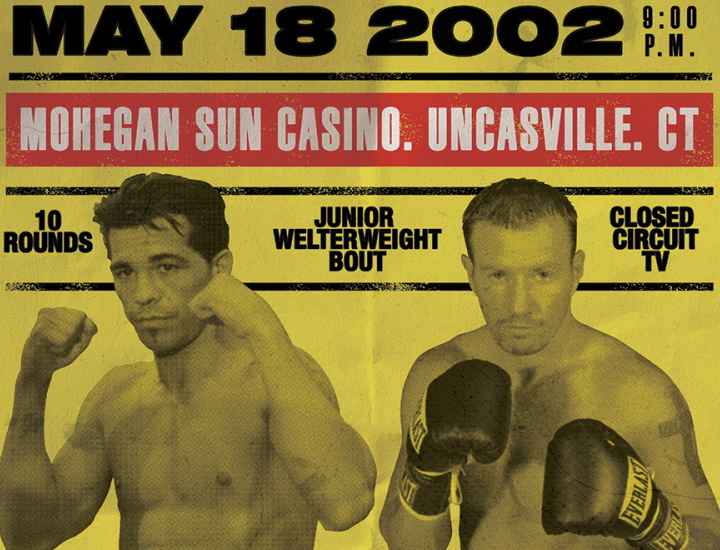Micky Ward was certain he had blown his chance to fight Arturo Gatti.
During their limo ride back from Freeman Coliseum in San Antonio the night of January 5, 2002, Lou DiBella, who was Ward’s promoter, tried to convince the loveable everyman whose life story later became an Oscar-winning motion picture that his technical-decision defeat to Jesse Leija might not have cost him the Gatti fight. The former HBO Sports executive knew that his successors at the network would still be interested in Gatti-Ward, assuming Gatti would defeat Terron Millett three weeks later, because Gatti and Ward would make magic in the ring.
“Micky was like crying in the limo,” DiBella recalled to BoxingScene.com. “He was like lamenting, ‘Aw, f—! It was a [technical decision]. I didn’t get the win. There goes my shot with Gatti.’ And I’m like, ‘Not so sure, Mick. Got a weird feeling that this actually, you know, if we’re willing to be more negotiable, this might actually work in our favor.’ And that’s what happened.”
What happened four months later – 20 years ago today at Mohegan Sun Arena in Uncasville, Connecticut – is something boxing fans worldwide won’t ever forget.
Gatti-Ward I was 10 rounds of unfathomable brutality between two unbelievably brave, resilient warriors who walked through trauma that would’ve broken most men. The first fight of their trilogy was “Rock’Em Sock’Em Robots” come to life, “even more than you can dream of,” according to the late Emanuel Steward, who called their stunning slugfest from ringside for HBO.
Ward won a majority decision in part because he sent Gatti to one knee 15 seconds into the ninth round with a trademark left hook to the liver and because referee Frank Cappuccino deducted a point from Gatti for landing a low blow in the fourth round.
Judge Richard Flaherty also scored their incredible ninth round 10-7 for Ward, despite that Gatti got off the canvas and made it competitive. Had Flaherty scored that round 10-8 for Ward, as did judges Frank Lombardi (94-94) and Steve Weisfeld (95-93), his final score would’ve been 94-94 and their fantastic fight would’ve resulted in a majority draw.
“There’s no way we would’ve fought Micky again if it were a draw,” Pat Lynch, the late Gatti’s manager, told BoxingScene.com. “We would’ve moved on because Arturo Gatti was still Arturo Gatti. Even if we got a little bit of pressure from people, I would’ve looked to go in another direction.”
Instead, Gatti exercised his contractual right to an immediate rematch with a rival who became his close friend and later his trainer for Gatti’s final fight. Gatti avenged his loss comfortably in their 10-round rematch, but he insisted on affording Ward the payday that came along with their third HBO bout, another 10-round, unanimous-decision win for Gatti.
Their last two fights, which both took place at Boardwalk Hall in Atlantic City, were entertaining at times. It is their first fight, though, that remains one of the most memorable brawls in boxing history.
“I was sitting on the steps in the neutral corner, and you just could not believe the f—— punishment both guys accepted,” Carl Moretti, then the matchmaker for Gatti’s promoter, Main Events, told BoxingScene.com. “You wondered, ‘How in the world are they doing this?’ You were just in awe of it. In person, it’s the greatest fight I’ve ever seen.”
The Boxing Writers Association of America and The Ring magazine named Gatti-Ward the “Fight of the Year” for 2002. The ninth round, in particular, was a spectacular display of sustained, reciprocal violence that’d be almost impossible to top.
Gatti, who appeared just about out on his feet toward the end of that stunning ninth round, showed unforgettable fortitude by coming back to win the 10th round. No one compassionate could’ve blamed Gatti’s trainer, Buddy McGirt, had he stopped their first fight during the ninth round, which Steward called “the round of the century.”
“With the intensity of those last four, five rounds, you thought that each guy wasn’t gonna get through it, that each guy could lose,” Moretti said. “If somebody got stopped, you wouldn’t have been shocked. It was that type of close fight and, you know, I doubt you’ll see that type of fight ever again in this day and age because commissions and referees don’t let that type of brutality go on in the ring. They’ll stop it, which I guess is a good thing, but a bad thing, too.”
A reinvigorated Gatti had shown all of the aforementioned attributes in previous slugfests with Wilson Rodriguez, Tracy Harris Patterson, Angel Manfredy and Ivan Robinson, which was why so many people had high hopes for a fight that somehow exceeded expectations.
“You knew it was gonna be a great fight,” Lynch said. “But to have seen that, I think I was just kind of stunned after it was all over. You just couldn’t believe what you had just witnessed, you know? It was just incredible.”
A prideful DiBella treasures Ward’s win as one of the crowning achievements of a career that’ll lead him into the International Boxing Hall of Fame next month in Canastota, New York.
“It was one of the greatest nights I’ve ever been a part of, a night that changed people’s lives,” DiBella said. “I mean, strangely, in defeat it cemented Gatti as a superstar even more and gave Micky the glory he deserved and created history for Micky and created a whole career. It was a life-changing night in some ways for both guys. HBO had that ‘Legendary Nights’ series. What’s more legendary than that night? That’s one of the great nights in modern boxing history. It was the modern-day Basilio-DeMarco. It was an ultra-grungy, painful war between two guys who didn’t understand what the word quit meant.”
Keith Idec is a senior writer/columnist for BoxingScene.com. He can be reached on Twitter @Idecboxing.
